Valet Trash Collection Services Reminder
In December 2019, the North Carolina Building Code Council (BCC) approved to amend the 2018 NC Fire Code, Section 304.4 (below). The approval included specifications and procedures that trash valet providers and properties should prepare to follow. The final adoption of these policies, procedures and specifications are expected to occur sometime later this fall. Note: Companies have until January 1, 2021 to fully comply with the fire-retardant receptacles as outlined below in 4a & b.
304.4 Valet Trash Collection Services
- Combustible trash in means of egress. Combustible trash or recyclable materials shall not be placed in exits, exit passageways, in enclosures for stairways or ramps, in corridors, in elevator lobbies or on egress balconies except as permitted by the following:
- Combustible trash or recyclable materials in corridors or on egress balconies of Group R-2 occupancies that is awaiting scheduled valet trash collection in accordance with subsections below.
- Valet Trash collection. Trash or recyclable materials awaiting valet trash
collection shall only be placed in a corridor or on an egress balcony within 5 hours of scheduled pickup and shall not obstruct the minimum egress width required by Section 1031. Trash or recyclable materials awaiting valet trash collection shall be placed completely inside of one or more containers with a closed lid that complies with subsections below. Additional trash or recyclable material placed outside of compliant containers are prohibited in exits, exit passageways, corridors or egress balconies.
- Valet trash collection containers. Containers used for valet trash collection shall not exceed a capacity of 2.0 cubic feet (15 gallons, 0.06 cubic meters) and shall be provided with tight-fitting or self-closing lids. Containers and lids shall comply with the following:
- Containers and lids located in an area that is protected by fire sprinklers in accordance with Item 1 shall be constructed entirely of noncombustible materials or materials that meet a peak rate of heat release not exceeding 300 kW /m2 when tested in accordance with ASTM E 1354 at an incident heat flux of 50 kW /m2 in the horizontal orientation. Containers and lids shall be listed or bear the label of an approved agency that validates compliance with this requirement.
- Containers and lids located in an area that is not protected by fire sprinklers in accordance with Item 1 shall be constructed entirely of noncombustible materials or materials that meet a peak rate of heat release not exceeding 150 kW /m2 when tested in accordance with ASTM E 1354 at an incident heat flux of 50 kW /m2 in the horizontal orientation. Containers and lids shall be listed or bear the label of an approved agency that validates compliance with this requirement.
It has come to our attention that some companies are having difficulty with ordering new fire-retardant containers because of delays due to COVID-19. We are reaching out to BCC members in an effort to pose this concern for their consideration.
Once the final adoption takes place, properties will be expected to follow the policies, procedures and registration as outlined below, so prepare now:
304.4.3 Policies and procedures. Apartment management shall have written policies and procedures in place, enforce compliance, and upon request provide a copy of such policies and procedures to the authority having jurisdiction.
304.4.4 Revocation. The use of doorstep refuse and recycling collection containers in apartment occupancies is revocable by the fire code official for violations of this section.
304.4.5 Registration of companies. Each valet trash collection site shall be registered with the North Carolina Building Code Council. The following information shall be provided:
- Name of company performing the collection service
- Contact phone number for the company
- Name of the apartment community
- Site address
- Hours collection service will be performed
Upon completion of the information required in 304.4.5 (1-5) above, a registration certificate will be provided to the company for each site. The registration certificate shall be kept on the premises where the service is provided and made available to the fire code official upon request.
